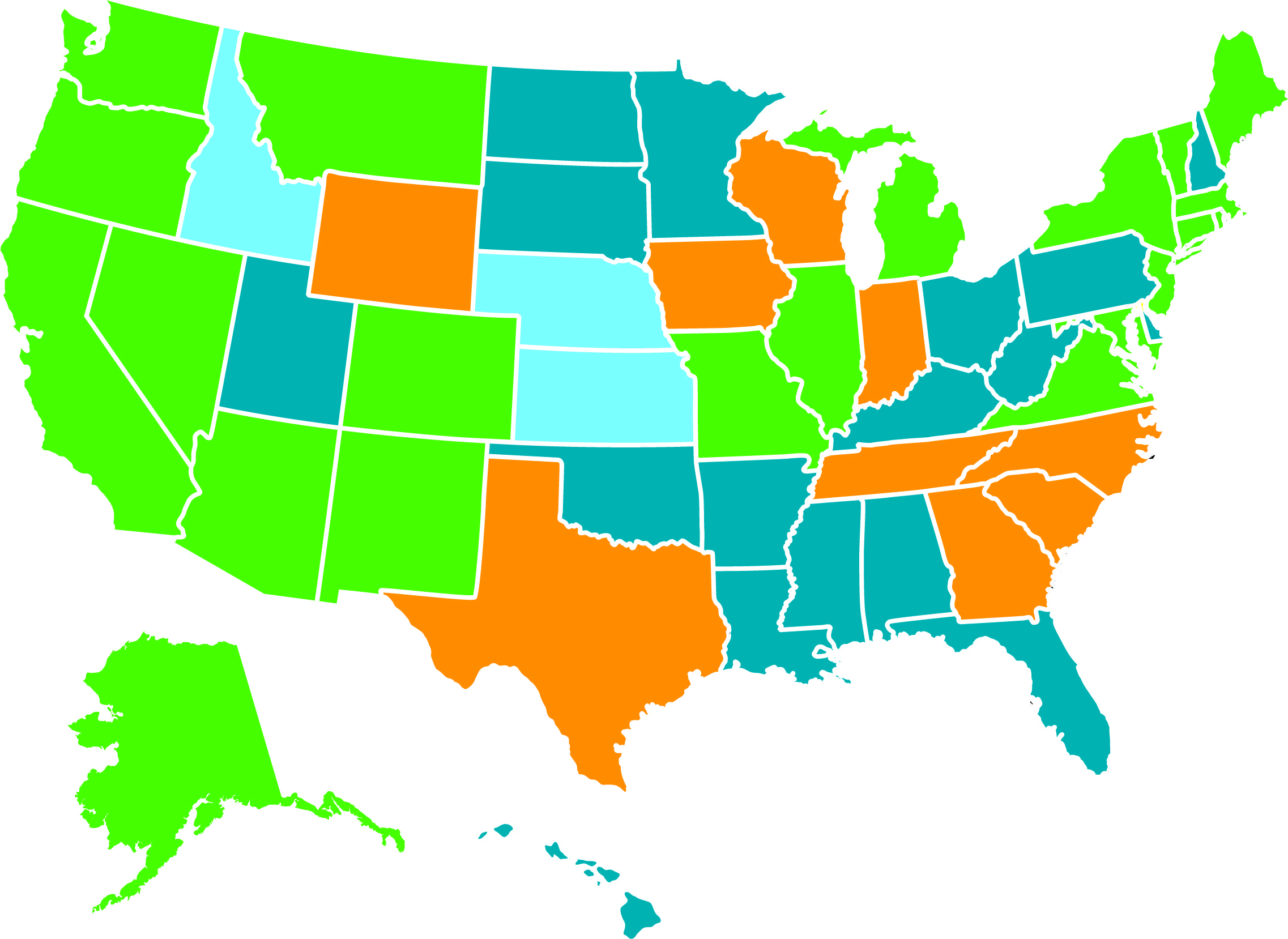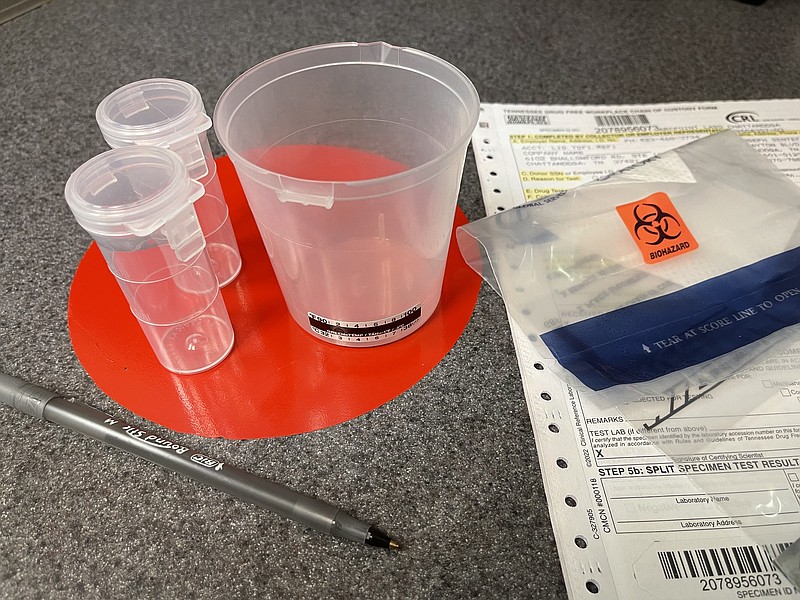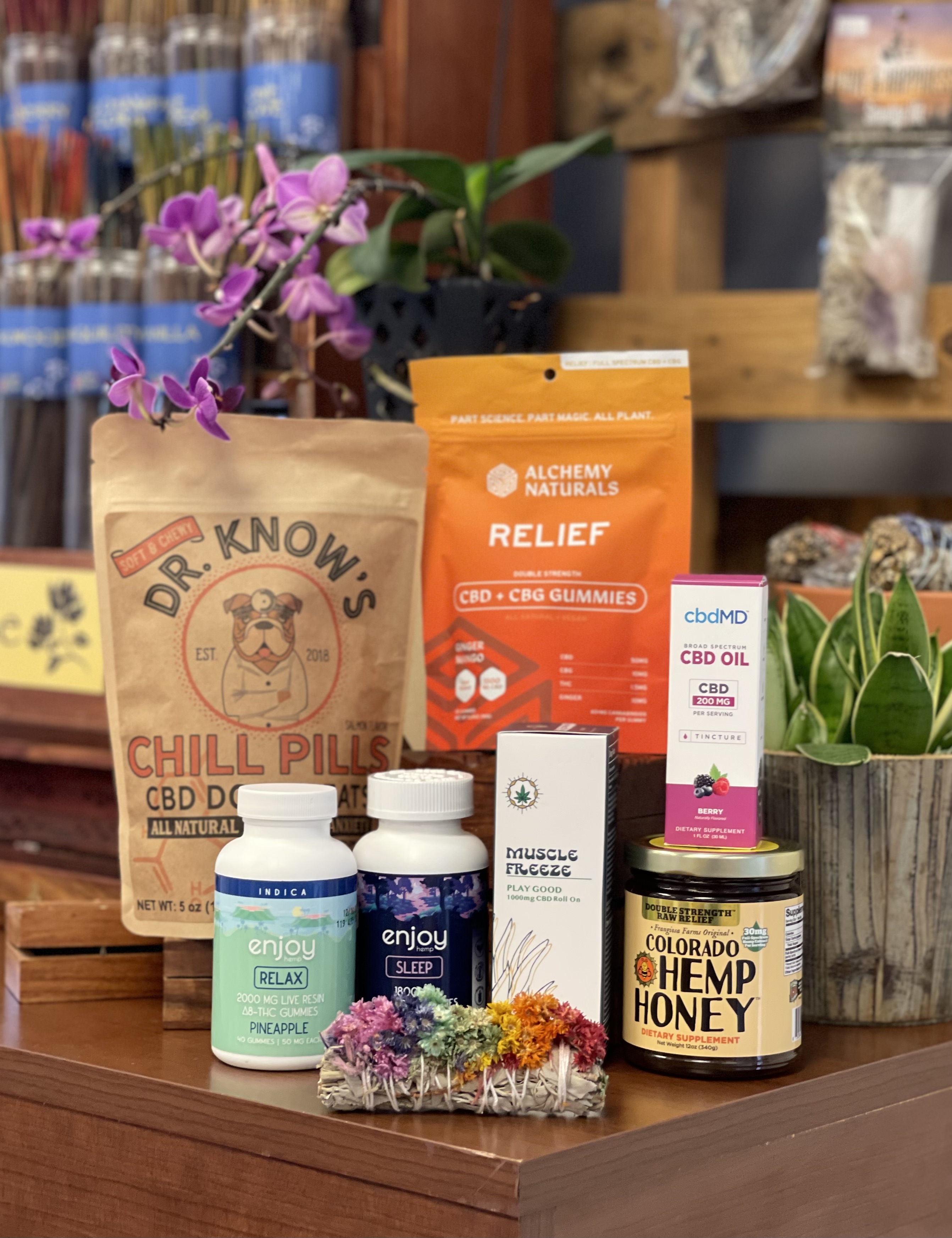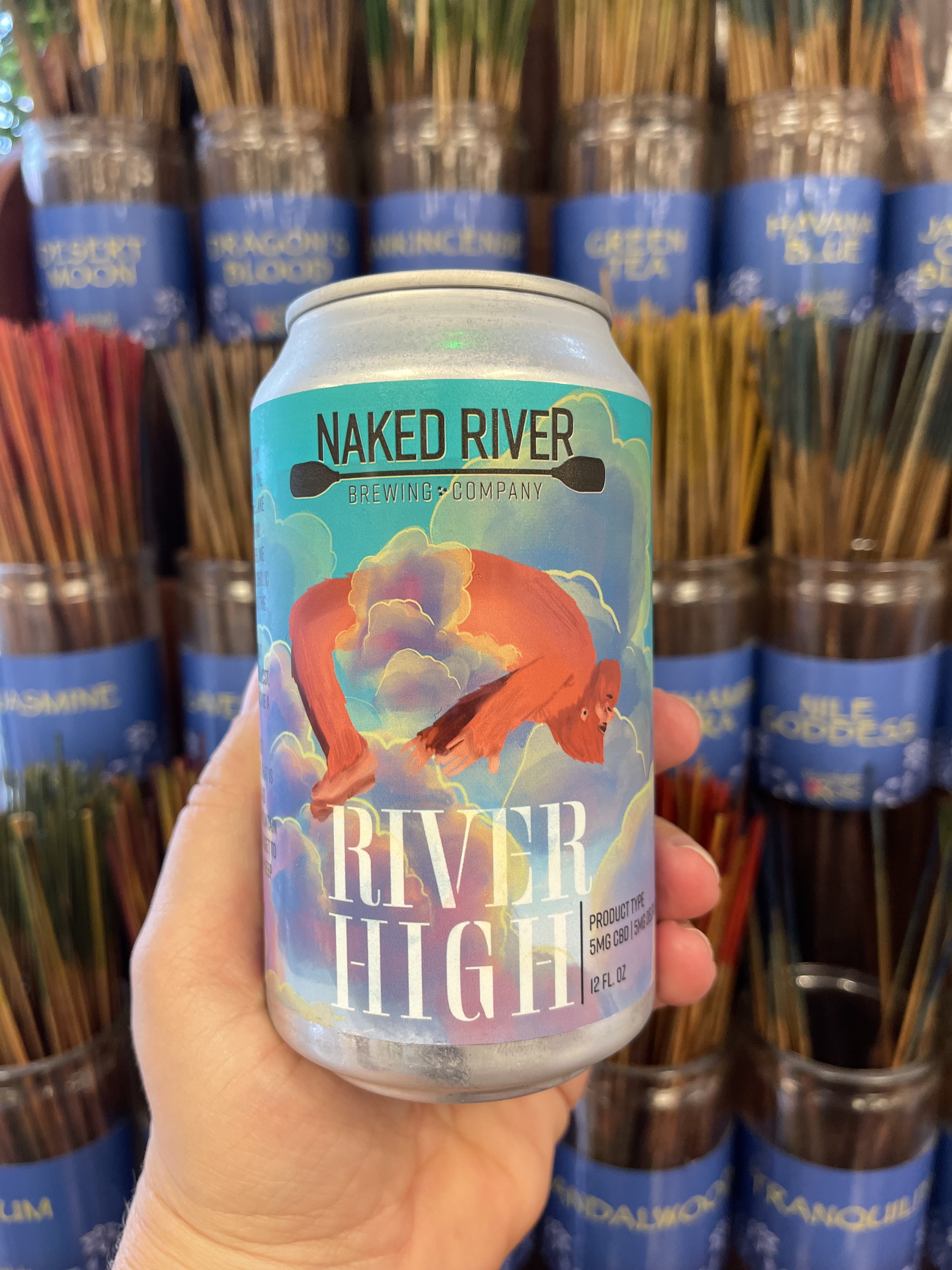Medical marijuana is legal in 38 states. Recreational use is allowed in more than 20. And across America, companies are trying to make sense of it all when it comes to hiring and retention policies.
Much of that work falls to people like Meg Patton, a manager who works remotely from Chattanooga for Sirius Staffing, a recruiting agency with offices across the country. In her position, she's tasked with finding employees for a wide range of industries.
With the unemployment rate near record lows, finding skilled employees is more challenging than ever, she says. In the past, she has had multiple applicants for jobs — and now that's flipped, with applicants often having multiple job choices. Continually evolving laws, especially those around marijuana, add another level of complication.
"[Drug testing] probably does shrink our applicant pool, and we're already struggling to find enough candidates," says Patton. When applicants know the company requires a clean pre-employment screening, many will simply seek employment elsewhere.
"We do see positive drug tests, and there's nothing wrong with that. It may be legal in their state. But depending on the job and what's required, it may eliminate that person as a candidate."
The most difficult positions to staff, she says, are those with safety regulations, like trucking or manufacturing, where operating heavy machinery might be involved. But most professions are hard to staff these days, she says, using teaching and nursing shortages as examples.
"The long and short is, it's a problem," she says. "You have to have people. And this is at every level of jobs, from the top to the bottom of industry."
Merri Mai Williamson is a 30-year human resources professional and has founded two related businesses — an HR consulting firm and a background checking service.
Right now, she says, one of the biggest complications companies are facing, especially those with offices in multiple states, is how to handle drug testing. Should they follow the laws from the strictest state; or should they handle each employee's situation state by state?
"The safer route is to go state by state and set your policies for the locations," she says, even if more time-consuming.
If a company is too restrictive, she says, and an employee in a less restrictive state decides to challenge the decision, he or she could. Or, if someone who has been offered a job tests positive while living in a legal state, and that could eliminate the person from employment, he or she could challenge that.
Even within a single company, drug testing can get complicated because there is no "one size fits all" for all employees, says Williamson. In construction, for example, machine operators may need to adhere to stricter standards than employees working in an office environment.
But overall, she says, drug testing in the modern workplace has become difficult for almost everybody. Even industries that are typically considered "low-risk" in terms of safety, like food service and retail, have opted to stop drug testing all together because it makes hiring so problematic.
Drug testing has created a bit of a paradox for many employers, says Scott Simmons, a labor and employment lawyer with the Miller & Martin law firm in Chattanooga.
More and more, when applicants learn about pre-screening drug tests, they opt out and apply elsewhere, he says. But especially for blue-collar positions, for an employer to qualify as a Drug-Free Workplace (which reduces insurance costs and is required in many contract situations), there is a mandate to conduct a 10-panel test.
"So employers are in a tough spot," says Simmons. "They're having trouble recruiting applicants; but if they soften requirements, they lose out on future work. It's a Catch 22 — they're struggling no matter what."
In most cases, he says, he advises clients to not worry about employees' behavior outside of work. With the cultural shift in the acceptance of marijuana, most employers, other than those in safety-sensitive industries, are willing to look the other way as long as it doesn't interfere with the job.
"When it comes to off-duty conduct, employers are generally wise to leave that alone," he says. "There are other incidents of off-duty conduct I would be more worried about, like child pornography as an example. But recreational drugs is almost a 'don't ask, don't tell.'"
But for the foreseeable future, state marijuana laws and and how companies craft policy are in a state of flux. Simmons points to Illinois as an example, a state that decided companies cannot terminate an employee for off-duty marijuana use.
Many states have legalized the possession and use of small amounts of marijuana. In Tennessee, possession and use is still illegal.
"Tennessee is kind of the Wild West," he says. "It's the absence of that law that allows employers to do what they like. That's one of reasons Tennessee is a popular place for new business — it's a deregulated place for tax incentives, draw employs at a decent pay rate, without worrying about state government looking over your shoulder."
"This is sort of a 'new work' we're living in. And I don't think it's going to change. I think what we're seeing is similar to the end of Prohibition in the 1920s, where alcohol sort of became part of the culture. I think we're seeing the same kind of shift in the view toward marijuana."
 Contributed graphic / The State of Marijuana Laws: GREEN States that allow recreational and medical marijuana use DARK BLUE States with comprehensive marijuana programs ORANGE States that allow CBD or low-THC products LIGHT BLUE States with no public cannabis access program / Source: Society of Human Resource Management/Created by Lisa Nagele-Piazza, Allen Smith and Mauro Whiteman using Datawrapper
Contributed graphic / The State of Marijuana Laws: GREEN States that allow recreational and medical marijuana use DARK BLUE States with comprehensive marijuana programs ORANGE States that allow CBD or low-THC products LIGHT BLUE States with no public cannabis access program / Source: Society of Human Resource Management/Created by Lisa Nagele-Piazza, Allen Smith and Mauro Whiteman using DatawrapperQ&A with Scott Simmons
Q. With more states relaxing laws against marijuana use and the labor market tightening, how are you seeing employers change their drug policies?
A. This is becoming an increasingly frustrating issue for many employers, particularly those in the construction and manufacturing industries. A common question I receive is, "Can we simply eliminate any reference to marijuana/THC in our drug policy, particularly with respect to testing?" In the construction industry, in particular, we're running into even more issues, as most government contracts (and large prime-contractor contracts) require Tennessee subcontractors to be certified as a Tennessee Drug-Free Workplace. The requirements of that program, however, mandate that marijuana and THC be tested at certain minimum levels. So, on the one hand, the contractor risks losing significant business; on the other hand, the contractor risks being unable to staff the business it does get. It's becoming a real problem.
Q. What policies and procedures do you recommend for employers to establish for employees regarding illegal drug usage?
A. Employers can do whatever they'd like. They just need to be consistent in the application of whatever policy they choose to put in place. If the company has certain safety-sensitive positions (a forklift driver, for example), however, it should certainly have stricter drug policies for those positions.
Q. Specifically, do employers have to establish an employee policy or handbook to ban illegal drug use to make such usage a cause for termination or other disciplinary action?
A. Not really. It's pretty common sense that if an employee shows up to work and he's stoned or drunk, the company is going to fire him. Policies are good, but common sense is still paramount.
Q. Are employers free to discipline or fire workers for marijuana use in states where marijuana is now legal?
A. Absolutely. Just because an employee is allowed to smoke weed outside of work doesn't mean he can show up to work and do whatever he wants. By way of analogy, just because the Constitution guarantees free speech, it doesn't mean an employer can't fire an employee for such speech. They're two different arenas.
Q. Do you have specific recommendations on what drugs are acceptable and what are not? How do you allow for the prescription use of drugs such as certain opioids that may show up in drug tests?
A. Even if the employee is using prescription opioids, it doesn't mean he or she can use them safely while at work. Just because it's legal to take oxycodone doesn't mean the employee is allowed to drive a dump truck under the influence of those medications.
Q. In Tennessee, do you have the right to terminate an employee who tests positive for drug use, even if a substance such as marijuana is a legal drug in some states?
A. Absolutely.
Q. How do you test for illegal drug use of employees and what appeal rights do workers have if they disagree with the drug results?
A. Testing is generally done in the following situations: 1. following a conditional offer of employment; 2. post-accident; 3. random; or 4. upon reasonable suspicion that the employee is under the influence. The employer can use any (or none) of these methods it chooses. In Tennessee, it's pretty much fair game, and the employer has the power.
Q. Can you make pre-employment drug screening a condition of hiring a worker? Can you randomly conduct drug tests on employees, with or without cause?
A. Yes. (To both questions)
Q. If two employees each test positive for drug usage, is an employer required to impose the same disciplinary action or termination for both workers or can the employer treat each employee differently?
A. It depends on the circumstances but, generally, the employer should attempt to impose punishment uniformly.
Q. How do you recommend that employers respond to employees with drug or alcohol addictions needing treatment and what do you do when they self-identify or acknowledge a drug problem?
A. When this occurs, it becomes an inquiry under the Americans with Disabilities Act (ADA), rather than a discipline issue. That said, the employee cannot simply cry "addiction" when they've been caught with drugs or alcohol in their system and use that as an excuse not to be disciplined.
Scott Simmons is a member at Miller & Martin law firm, specializing in labor and employment matters.
READ MORE
* Five notable trials that reverberated throughout the Chattanooga region
* Chattanooga Bar Association supporting the local legal community for 125 years
* Civil rights figures Reena Evers-Everette, Jerry Mitchell to speak in Chattanooga in September





